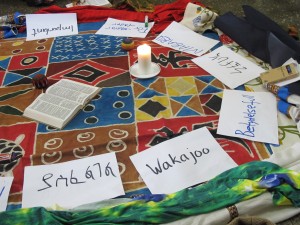Anders Göranzon is sent by the Church of Sweden’s International Department to work as University lecturer and priest in Pietermaritzburg in South Africa. You can follow his own blog here.
The two disciples that went to Emmaus were not invited by anyone. They just went, becausethey lived in Emmaus. The journey, however, made them return to Jerusalem. Something made them change their minds, made them change direction. This story, captured by Luke, has since inspired Christians and others throughout the centuries.
This time Church of Sweden invited some of its partners to take part in a similar encounter. Invitations were sent from Church of Sweden’s head office to Brazil, Ethiopia, Tanzania and South Africa as well as to some of the dioceses in Sweden. With facilitators the group that met a week in Nairobi, in the beginning of November, consisted of 22 persons.
The framing story tells us about three persons walking between Jerusalem and Emmaus. At this bible sharing workshop we were more than that and we did not physically walk so much. Our journey was more of a spiritual journey. It was a rewarding experience. Almost two thousand years later we thought that the Emmaus narrative could inspire us in our lives as human beings and as church. And it did!
The point of departure was given through a reference to St. Augustine, who said that God has written two books, namely the book of our lives and the Bible. The purpose of the week was to allow those two books to communicate. In doing that, we believed that we would hear the voice of God into our lives.
The first chapter of the book of our lives are our names. We spent quite some time learning the different names in the group. It is a challenge to hear and be able to pronounce names from different continents. Nevertheless it is extremely important. When we read from Luke 24, we saw that Luke did not mention the name of one of the disciples that walked to Emmaus. In our understanding the reason for this could be that the disciple was a woman, as women in the bible often are referred to without names. We did not want this to be the case in our Emmaus walk. So, this is an important learning: spend time learning names in a group and something will happen to that group.
Likewise the facilitators emphasised the importance that both women and men were given opportunities to talk. Equally important was that participants from Latin America, Europe and Africa were given the same chances to contribute. We were all reminded that God created us with two ears but only one mouth.
One thing that contributed to the atmosphere was that not everyone understood English. This meant that translation was needed throughout the week. At the start I thought: is this going to work? We need to make use of two languages (English and Portuguese) the whole time – is it really possible? Won’t it slow down the process? After the workshop my answer is: yes, it slowed down the process – and that in itself was helpful. It also gave a new perspective: maybe we need to be prepared to translate our thoughts to one another even if we speak the same language?
The aspect that I found most important was however the importance of reading the two books – our lives and the Bible – in a group. It gave new perspectives and we were all amazed that we could spend a day reading and working around one single bible text ad still understand new things.
I want to mention one ‘aha- moment’. We were asked to look for stories in the Bible that are a similar to the Emmaus walk. Not stories that tell the same thing, but stories that help us to understand the Emmaus experience. In many groups the book of Ruth came up. This book also tells a story about people walking. Ruth makes a promise that she will always be with her mother-in-law, Naomi. To me the connection between Ruth and Jesus became very clear. (No surprise that Ruth is part of Jesus’ genealogy according to Matthew 1).
For me the week was very helpful. I learnt a lot about myself, my tradition and how it relates to the Bible. I look forward to the next time we meet. A few things I would like to see improved. One such thing would be to interact with a local congregation. It was the plan for Nairobi, but due to unforeseen circumstances it could only be done for some of us. I also think the next time we meet will be even better, because then we know and understand what kind of workshop we take part in.
Karibia! This word in kiSwahili, will remain within me for a long time. It is used when Luke says that Jesus ‘came near’ and walked with the two disciples. We sang and danced a song with this word a lot during the week and I believe that we felt the presence of Jesus strongly. When we are near to one another and to the biblical narrative, Jesus also comes very close. In this fruitful intersection much can happen. This is something I appreciated and take home from the workshop and I will keep on dancing and singing:
KaribiaYesu, karibia. Karibiakwetu, karibia.
(Come near Jesus, come near. Come near to us, come near).

Lämna ett svar